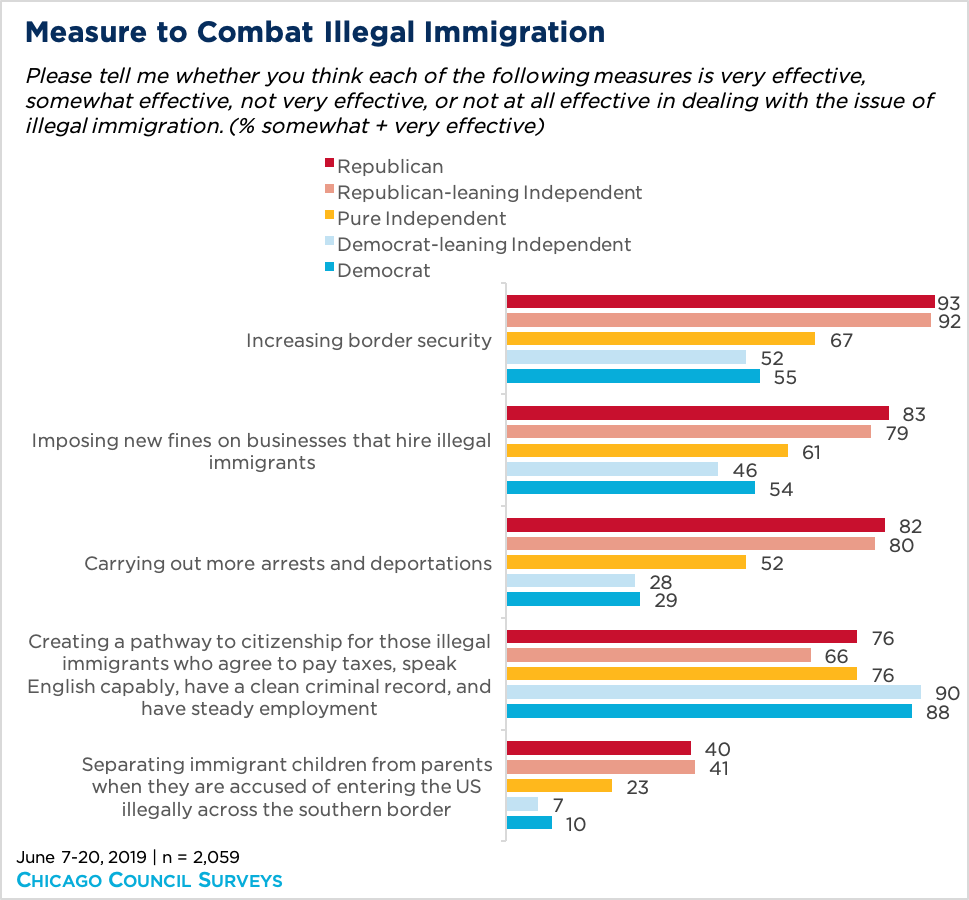Immigration Policies Could Create Risks for Candidates on Both Sides

On April 20, President Trump announced that an executive order to suspend immigration into the United States during the coronavirus crisis. But what does the American public think of this?
Introduction
In a tweet on the night of Monday, April 20, President Trump announced that he would be signing an executive order to suspend immigration into the United States during the coronavirus crisis. But when he unveiled the details the next day, the order fell short of a full ban, blocking most people seeking permanent US residency from receiving green cards for 60 days. Conservatives commentators were angered and had hoped the restrictions would be broader. In a broadcast after Trump’s White House briefing on Tuesday, Fox News host Tucker Carlson, criticized the plan, saying it “failed” to protect American jobs.
On the surface, immigration should be a losing issue for Donald Trump in the 2020 presidential election. While in the current environment, an overall majority of Americans favor a temporary ban on immigration (65%) during the coronavirus, poll after poll have shown consistently that solid majorities of Americans believe that immigration is good for the country and support a path to citizenship for immigrants that are in the country illegally. In several cases, these sentiments have grown since the election of Donald Trump. Recent surveys also find that Americans believe family separation is unacceptable and the conditions in immigrant detention centers are a serious problem. Yet, anti-immigration stances helped propel Donald Trump into the Oval Office in 2016, and recent polling shows that both parties may face risks on the issue.
Americans and Leaders Aren't Entirely on the Same Page
The Republican electorate broadly supports a temporary ban on immigration during the current outbreak (83%), but it does not fully align with the Trump administration on other immigration policies: only four in ten self-described Republicans favor separating immigrant children from their families at the border, and a large majority of Republicans also support a pathway to citizenship for undocumented immigrants who agree to pay taxes, speak English capably, have a clean criminal record, and have steady employment. While President Trump has sometimes appeared to favor a path to citizenship for undocumented immigrants—and is currently siding with business leaders’ views that immigrant workers are still needed to keep the food supply stocked and other industries staffed—his administration has also taken steps that may narrow the pool of immigrants eligible for that path.
Former Vice-President and presumed Democratic nominee Joe Biden’s reversal of his previous opposition to sanctuary cities (in 2007) got less attention in the press after the last Biden-Sanders debate. Biden also said he would call a moratorium on deportations of undocumented immigrants in his first 100 days, and after that only felons would be forced to leave. Much of this should play well with potential Biden voters, though the Democratic electorate is also internally divided on the issue.
Democrats are particularly positive toward immigration, given the greater diversity among Democratic party supporters and the party’s shift to viewing the issue through a humanitarian and civil rights lens rather than an economic one. The 2019 Chicago Council Survey finds that few Democrats consider immigration a critical threat to the country (19% vs. 78% of Republicans) and a majority of Democrats (88%) strongly support a path to citizenship for those illegal immigrants with the same conditions noted previously (pay taxes, speak English, clean record, steady employment). But Democrats also believe that border security and punitive actions against businesses that hire illegal workers are effective ways to deal with illegal immigration, and half support a temporary halt to immigration during the coronavirus outbreak (49%).
A deeper analysis shows that border security is seen to be especially effective among moderate/conservative Democrats–who comprise 43 percent of all self-identified Democrats. Majorities of moderate/conservative Democrats say that increasing border security (66% vs. 47% liberal) and placing new fines on businesses that hire illegal immigrants (61% vs. 49% liberal) are effective means to address the issue. Four in ten moderate/conservative Democrats (42%) also consider carrying out more arrests and deportations an effective policy compared to 19 percent of liberals.
How will Independents Lean?
Despite these intraparty differences, it is also true that since 2000, partisans generally vote for the presidential candidate of their own party. The group that most closely approximates potential swing voters in our data, and who are most likely to turn the tides of the election, are self-described Independents. Of the 35 percent of Americans in our survey who describe themselves as Independent, half say they lean toward either the Republican (26%) or Democratic (28%) party, and about half say they do not lean toward either party (46%; we refer to these as “pure” Independents).
Republican-leaning Independents are similar to Republicans in favoring more punitive measures against immigration, such as increasing border security, arrests and deportations, and imposing fines on businesses hiring illegal workers. But two out of three Republican leaners also favor creating a pathway to citizenship with conditions. By the same token, Democratic-leaning Independents look a lot like Democrats, with more favoring a path to citizenship than more restrictive measures.
Pure Independents lie in between. Similar to Democrats, they rate a pathway to citizenship as the most effective approach to dealing with illegal immigrants. But they are also more inclined than Democrats to say that increasing border security, imposing fines on businesses with illegal workers and carrying out more arrests and deportations are effective. And in the wake of the coronavirus outbreak, 67 percent of independents support a temporary ban on immigration. Given that these non-leaning Independents are a key bloc of voters to be won over in 2020 (15 percent of the overall survey sample), Democrats who ignore border security may risk ceding these voters to the Republicans.

Look for Immigration in the 2020 Election
With immigration as a key anchor for the Trump campaign, President Trump and conservative anchors like to paint Democratic leaders as open-border advocates who are soft on immigration. Besides pledging to reverse many of the restrictive immigration policies implemented under the Trump administration, Joe Biden needs to further his ideas for maintaining a safe border and under what conditions immigrants would or would not qualify for entry into the United States. In a February CNN Town Hall, Biden came closer to circumscribing who would be eligible for deportation, perhaps as a form of penitence for the Obama administration’s record number on deportations which he has since called a ‘big mistake.' Demonstrators have come out on Biden’s campaign trail to protest just that.
At the same time, President Trump has, at best, glossed over the specifics on whether a second Trump administration would be willing to implement a pathway to citizenship for the undocumented immigrants already living and working here. Biden’s past experience with border security and new movement toward the left on the immigration issue could pull off moderates in both parties who care about this issue.
Certainly for President Trump, his hardline immigration stance was a big motivator for his supporters in the 2016 elections and in the years since, this support has only solidified around him as he continues to encourage xenophobia. With the world reeling from the coronavirus pandemic, he has again seized upon this sentiment to further harden the line on immigration, restricting travel to and from much of Europe, Mexico, Canada, and China. While Trump’s rhetoric—and the rhetoric of many candidates—appeals to national pathos in one way or another, neither party has yet to address the issue adequately for the 2020 vote.



